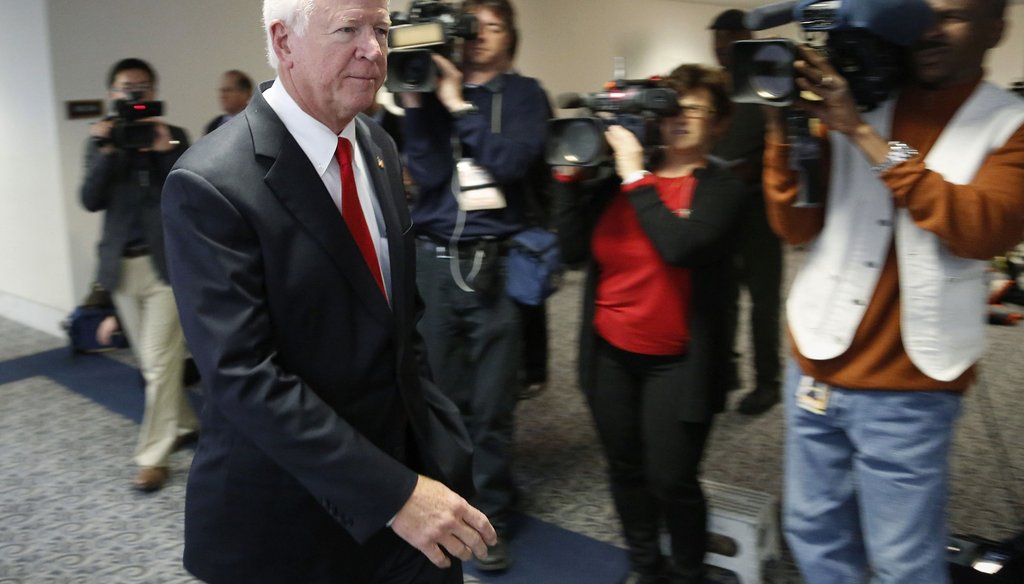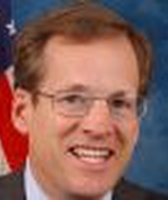Stand up for the facts!
Our only agenda is to publish the truth so you can be an informed participant in democracy.
We need your help.
I would like to contribute

U.S. Sen. Saxby Chambliss, R-Ga., arrives at a closed door hearing on Capitol Hill. The senator announced Friday he will retire rather than seek re-election in 2014 for a third term.
Saxby Chambliss, Georgia’s senior U.S. senator, surprised the political world Friday when he announced he’s not running for a third term in 2014.
PolitiFact Georgia thought we’d look back at how Chambliss has fared on our Truth-O-Meter.
PolitiFact Georgia has fact-checked Chambliss eight times. He has received two True ratings, three Mostly True ratings, two Half True ratings and one False rating.
Here’s a round-up of some fact-checks on or about Chambliss. Click on the rating to view the entire fact-check:
Chambliss votes more with Democrats than with conservatives.
A Georgia-based tea party leader made the assertion about the veteran Republican lawmaker during a segment on CNN. Tea Party Express chairwoman Amy Kremer was angry with Chambliss for voting for a bill to avert the so-called "fiscal cliff."
"I live in the state of Georgia and Saxby Chambliss is going to be primaried, our own senator. It's unacceptable to have somebody that votes with the Democrats more than they do with the conservatives, " Kremer said.
PolitiFact Georgia couldn't find any statistics that specifically show whether Chambliss has voted more frequently with Democrats than conservatives. There is some research that has examined how often he's voted with Republicans, and Chambliss hasn't strayed too far from Republicans on most issues. One example, the Open Congress website, says Chambliss votes with his party 92 percent of the time.
While there are votes by Chambliss that differed from what some senators considered conservative, data shows that Chambliss voted with the GOP the majority of the time.
We rated Kremer's claim False.
He has never voted for raising taxes.
Chambliss attempted to convince skeptical conservatives about his work on the "Gang of Six" by stating a claim about his track record on taxes.
"I can tell you that neither Lindsey nor I have ever been in the business --- nor have either one of us ever voted for increasing taxes, " Chambliss said. Chambliss was referring to U.S. Sen. Lindsey Graham, a Republican from South Carolina.
Chambliss did vote for an increase in the cigarette tax at one point. But that vote was part of a larger deal that actually led to a tax decrease for most people. News reports at that time said the deal would reduce taxes by about $140 billion for families and be the broadest tax cut since 1981.
By the standards of some of the most active federal tax watchdog organizations in the nation, Chambliss has not raised taxes. There was one clear example of a tax increase that would have an impact on smokers, but it was part of a bill that cut taxes for a large number of Americans.
We rated this claim True.
The Internal Revenue Service estimated it must hire "16,500 agents at a cost of $10 billion to the taxpayer" to enforce the federal health care overhaul.
When a constituent wrote to Chambliss in support of the federal health care overhaul, his office replied with a three-page defense of his opposition to the bill that included the IRS agent claim.
We found that Chambliss' claim has led a long existence with several incarnations, all of which are misleading. The 16,500 figure did not come from the IRS, but from Republican members of Congress who opposed the overhaul. That estimate was for employees, not "agents." And it didn't account for overhead costs, which even the claim's supporters acknowledged would likely lower the jobs number.
Chambliss' statement not only repeated an oft-criticized, misleading claim. He got it wrong. False.
Sign up for PolitiFact texts
"When we lower tax rates, we generate more in revenues. That happened in '86 with the Reagan plan, happened in 2001, following the Bush plan."
Chambliss offered this history lesson to argue for lowering personal income tax rates and corporate tax rates.
Chambliss was correct to say that revenues did rise after President Ronald Reagan lowered individual income tax rates, but that plan aimed to be revenue-neutral. The numbers show revenues declined in the first two years after the 2001 Bush administration tax cuts, so the senator's statement is off.
We rated his claim Half True.
Our Sources
See attached article.



















































